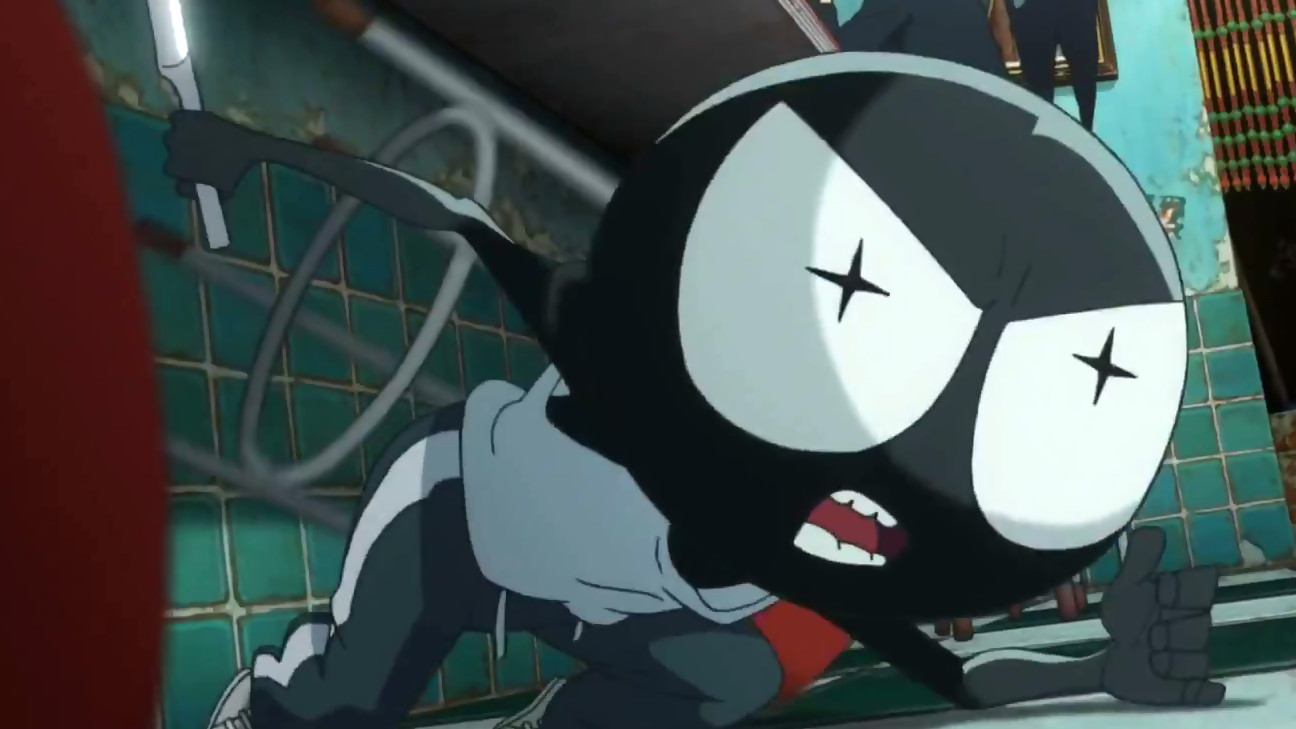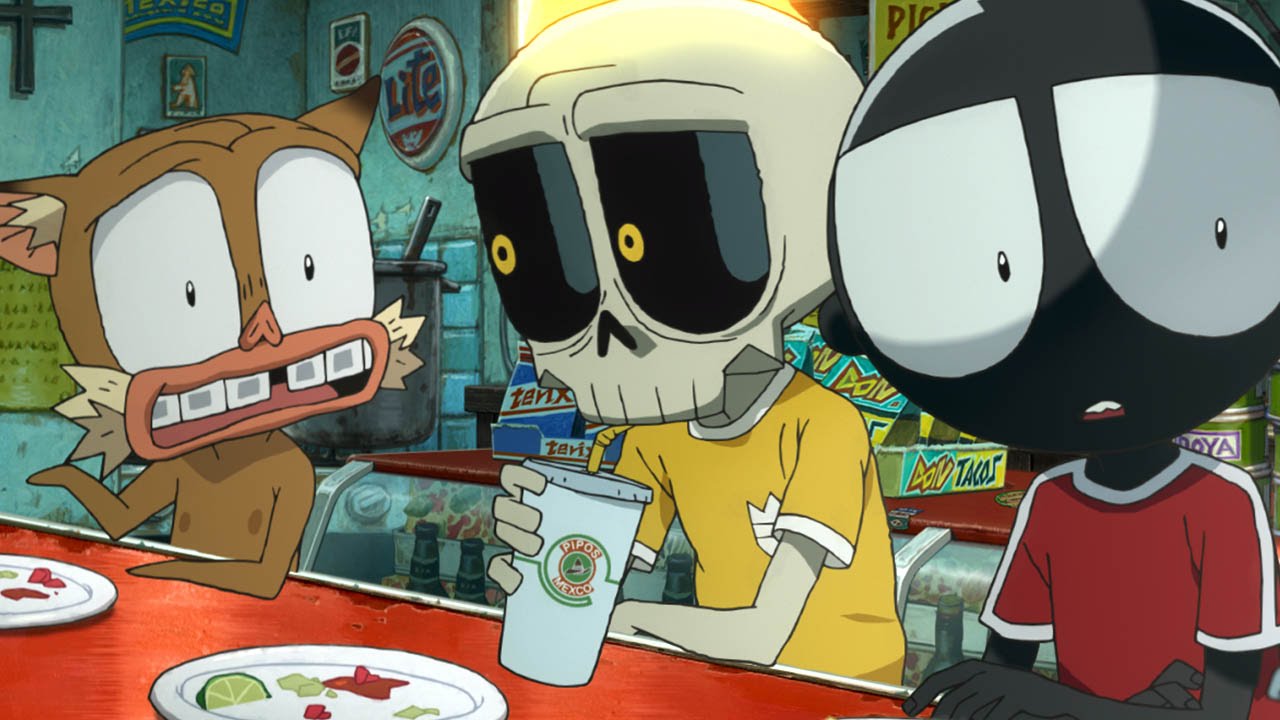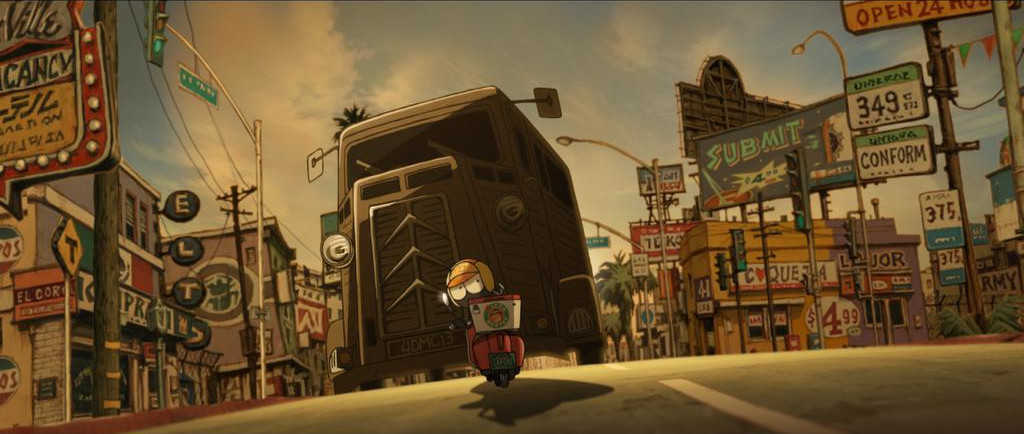Every Saturday this month, Tim will be taking a look at one of the films submitted for the Best Animated Feature Oscar.
 For lack of a better place to start, it must surely be the case that MFKZ is the most globally-minded animated film released in the United States in 2018. The screenplay was adapted by French writer Guillaume "Run" Renaud, from his own 2015 comic book. The animation was done by Japanese company Studio 4°C, under the co-direction of Renaud and Shojiro Nishimi. The setting is saturated in a pop culture vision of Los Angeles that feels influenced more by the Grand Theft Auto video game series, the Fast & Furious movie series, and rap videos than the actual life of the city's black and Latino communities, and the story is a criticism of systemic racism in the U.S. and the worldwide corporate greed that has led to the impending climate crisis. Plus it's a crypto-remake of John Carpenter's They Live.
For lack of a better place to start, it must surely be the case that MFKZ is the most globally-minded animated film released in the United States in 2018. The screenplay was adapted by French writer Guillaume "Run" Renaud, from his own 2015 comic book. The animation was done by Japanese company Studio 4°C, under the co-direction of Renaud and Shojiro Nishimi. The setting is saturated in a pop culture vision of Los Angeles that feels influenced more by the Grand Theft Auto video game series, the Fast & Furious movie series, and rap videos than the actual life of the city's black and Latino communities, and the story is a criticism of systemic racism in the U.S. and the worldwide corporate greed that has led to the impending climate crisis. Plus it's a crypto-remake of John Carpenter's They Live.
All of which is to say that the movie sure is… something. Something that is, frankly, quite a bit messy and confusing, possibly racist, and also exciting and startling in its originality.

The specifics of the story are that Angelino (voiced by Kenn Michael in the English dub distributed by GKIDS, friend to all animation lovers), a young man from a bad neighborhood in the bad metropolis Dark Meat City (the most thinly-veiled version of L.A. imaginable), is hit by a truck one day when he's distracted by a beautiful, and suggestively mysterious young woman. Upon waking, he's having odd visions, in which some people's shadows appear as tentacled monsters. After he tries to explain this to his dubious friends Vinz (Vince Staples) and Willy (Dino Andrade), Angelino attracts the attention of men in black suits, discovering in the process of fighting them off that he has inexplicable, downright supernatural fighting abilities.
That gives us enough to get started, and it's barely getting to any of what makes MFKZ (an abbreviated version of exactly the vulgarity it looks like) so very weird. And, to be frank, so very exhausting. The film is 90 minutes of almost unceasing surrealism wedged onto the realistic background drawings of Los Angeles, starting with the characters: Vinz is a pale-skinned human with a flaming skull for a head, Willy is some kind of dog-looking thing with braces, and Angelino himself is a scrawny humanoid with a perfectly round, shiny black head, sort of like if the Bic logo grew eyes and cursed a lot. They're all about two feet tall, and they exist, quite without comment, in a world full of normal-looking humans and other animal-like creatures.

The sheer madness of the setting – there is also a cult of luchadores who follow swarms of cockroaches like Biblical omens – gives MFKZ a great deal of appeal for its gonzo imagination, right up until the point that it doesn't any more. When the film starts to get deep into the alien conspiracy that dominates the second half, it becomes increasingly clear that Renaud is just having a grand time throwing ideas at the wall, with very little interest in stopping to see which of them stick. It all builds up to a fairly coherent, even clichéd series of revelations, and the film very obviously thinks that it has something important to say about the senselessness of unchecked global warming and the worldwide threat of rising fascism. I suppose it even does have something to say about those topics. At the same time, the film's caricature of real-world Los Angeles communities is so wildly reductive that it feels hard to credit it with having any actual stake in life as it is lived. Not to mention how buried all of the insights are within the whirlwind of sci-fi absurdities.
On the other hand, the film is a visual beauty. The characters are some peculiar, but appealing hybrid of Japanese anime lines and European children's comic book simplicity. There's something weirdly endearing about the gigantic eyes of the lead characters in particular, something guileless and childish in contrast to the very nearly non-stop blast of angry, violent, vulgar dialogue and behavior they're up to. And it also continues the recent trend in Japanese animation of creating fully three-dimensional spaces in a computer, and then painting them to look like flat backgrounds out of traditional animation.

In this case, more than in almost any recent example I can come up with, this means that the virtual "camera" has incredible freedom to speed around corners and down alleys, chasing the characters during the constant panicked running that the plot puts them through. In addition to how fully designed the world is, it's therefore also especially tactile, someplace you feel like you could easily walk through. The look of the film is as hectic as the plot, and there's something electrifying and magnetic about that.
It's a movie that is absolute committed to being as much as possible, all of the time, in all ways. The one thing that can stated without the slightest hesitation: it is not like anything else out there. As it turns out, there are some good reasons for that, but it's certainly dazzling and original and fervently alive, and even despite its flaws, I can't help but feel that it's also completely worth a watch.